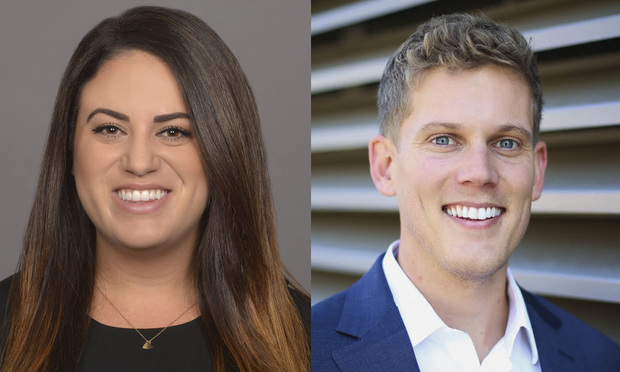Communication, Growth Opportunities Are Key to Retaining Millennial In-House Counsel
"I got the sense that all of them wanted to have a more holistic approach to law," John Moynan, general counsel of Slang Worldwide, explained. "They want to add value in more ways than the traditional legal skill set would provide for."
June 09, 2020 at 06:53 PM
6 minute read
 Lauren Strackbine, associate general counsel at the Jacksonville Jaguars, left, and John Moynan, general counsel of Slang Worldwide, right.
Lauren Strackbine, associate general counsel at the Jacksonville Jaguars, left, and John Moynan, general counsel of Slang Worldwide, right.
Millennials often jump from job to job for a better growth opportunity or a higher salary. However, clear communication and feedback, along with giving them responsibilities to grow within the company, can keep young in-house attorneys from looking for a new job every couple of years.
Lauren Strackbine, 32, associate general counsel at the Jacksonville Jaguars in Jacksonville, Florida, said she went in-house at AMN Healthcare after graduating from California Western School of Law because she knew that working at a law firm was not what she wanted to do.
"I get to approach issues with a legal lens and point out risks and come up with solutions to problems," Strackbine said.
Now at the Jacksonville Jaguars, Strackbine is responsible for transactions, risks and litigation for not only the Jaguars but its concert business and its wrestling promotion, All Elite Wrestling. Apart from always wanting to work in professional sports, she said she stays with the team because she sees how her efforts impact different parts of the business and she enjoys the small work environment.
John Moynan, 30, the general counsel of Toronto-based cannabis company Slang Worldwide Inc. who is based in Denver, had similar reasons for going directly in-house upon graduating from the University of Colorado Law School.
"I had this sense that working in-house as opposed to working at a firm gave you an opportunity to see the fruits of your labor and have a little more skin in the game," Moynan said.
Managers need to have a more direct level of communication with millennial in-house attorneys, Susanna McDonald, the chief legal officer of the Association of Corporate Counsel in Washington, D.C., said. Managers should directly speak to younger attorneys about what is expected of them and should listen to what those attorneys expect out of their work.
"This is a much better approach than assuming that what millennials want is unreasonable, or that they are entitled brats. Genuine conversation can lead to surprising results," McDonald said.
Mike Evers, the founder of executive search firm Evers Legal in Chicago, said, "Millennials crave micromanagement in the right sense of the word."
"The best way to retain them is to keep an upward trajectory visible. They want to know what the next steps on the ladder are," Evers said. "They crave feedback more so than a professional in their 50s."
According to a report published by Akumina last year, 75% of millennials in the workforce believe that job-hopping will help them attain their career goals. Strackbine said she was not interested in job-hopping but she knew she would not be able to have a career working in sports without some in-house experience beforehand.
"Someone told me while I was in law school that the most important thing to do is get a solid foundation of legal skills," she explained.
After working at AMN Healthcare for three years, she reconnected with her former law school classmate, Jacksonville Jaguars general counsel Cassie McBride, at a wedding where they discussed the possibility of Strackbine coming to work in-house at the Jaguars.
"It turns out the reason I was hired was because of my health care experience," Strackbine explained.
While she initially did not see the parallels between sports and health care, she said the team needed a lawyer who understood workers' compensation issues for injured players and knew how to handle sensitive medical records.
She explained that job-hopping is something to consider when hiring younger attorneys, but going from one job to the next can also be seen as a steppingstone.
"It is a question that needs to be asked when you see a resume with a different job every two years, but I also don't see anything wrong with building that legal foundation," Strackbine explained.
Moynan has not had the opportunity to jump jobs, adding he feels like an anomaly among his peers. Although having only been the general counsel of Slang Worldwide for a year and a half, he said he does not plan on leaving anytime soon because the work is rewarding. In a relatively new industry like cannabis, he said he is able to see how his work grows not only the business but contributes to the growth of the industry.
"That is a huge part of why I continue to love what I do. I love seeing how I can make a direct impact as opposed to working on a one-off project," Moynan said.
He said he sees that in future law students as well. Having just finished a round of interviews with current law students for a legal internship position, he found many had the same approach to law that he has.
"I got the sense that all of them wanted to have a more holistic approach to law," Moynan explained. "They want to add value in more ways than the traditional legal skill set would provide for."
For now, Moynan serves as the only in-house attorney at Slang Worldwide. He said, however, he is not worried about job-hopping for the future as he does build a legal department because of the work that is offered and because of how the company has structured compensation.
"We have the opportunity to provide people with equity compensation. People are more likely to stick around because they have the opportunity to watch their net worth grow," Moynan said.
Young attorneys who may be prone to job-hopping may also be sticking with the current employers for the foreseeable future because of the state of the economy.
David Holme, CEO of Chicago-based legal technology provider Exigent Group Ltd., said it is hard to explain leaving a job because of a lack of growth or training opportunities outside of the law.
"There are now 30 odd million people unemployed in the U.S.," Holme said. "Job-hopping doesn't look quite as appealing."
This content has been archived. It is available through our partners, LexisNexis® and Bloomberg Law.
To view this content, please continue to their sites.
Not a Lexis Subscriber?
Subscribe Now
Not a Bloomberg Law Subscriber?
Subscribe Now
NOT FOR REPRINT
© 2025 ALM Global, LLC, All Rights Reserved. Request academic re-use from www.copyright.com. All other uses, submit a request to [email protected]. For more information visit Asset & Logo Licensing.
You Might Like
View All
Exits Leave American Airlines, SiriusXM, Spotify Searching for New Legal Chiefs
2 minute read


After Botched Landing of United Airlines Boeing 767, Unlikely Plaintiff Sues Carrier
5 minute readTrending Stories
- 1Bass Berry & Sims Relocates to Nashville Office Designed to Encourage Collaboration, Inclusion
- 2Legaltech Rundown: McDermott Will & Emery Invests $10 Million in The LegalTech Fund, LexisNexis Releases Conversational Search for Nexis+ AI, and More
- 3The TikTokification of the Courtroom
- 4New Jersey’s Arbitration Appeal Deadline—A Call for Clarity
- 5Law Firms Look to Gen Z for AI Skills, as 'Data Becomes the Oil of Legal'
Who Got The Work
J. Brugh Lower of Gibbons has entered an appearance for industrial equipment supplier Devco Corporation in a pending trademark infringement lawsuit. The suit, accusing the defendant of selling knock-off Graco products, was filed Dec. 18 in New Jersey District Court by Rivkin Radler on behalf of Graco Inc. and Graco Minnesota. The case, assigned to U.S. District Judge Zahid N. Quraishi, is 3:24-cv-11294, Graco Inc. et al v. Devco Corporation.
Who Got The Work
Rebecca Maller-Stein and Kent A. Yalowitz of Arnold & Porter Kaye Scholer have entered their appearances for Hanaco Venture Capital and its executives, Lior Prosor and David Frankel, in a pending securities lawsuit. The action, filed on Dec. 24 in New York Southern District Court by Zell, Aron & Co. on behalf of Goldeneye Advisors, accuses the defendants of negligently and fraudulently managing the plaintiff's $1 million investment. The case, assigned to U.S. District Judge Vernon S. Broderick, is 1:24-cv-09918, Goldeneye Advisors, LLC v. Hanaco Venture Capital, Ltd. et al.
Who Got The Work
Attorneys from A&O Shearman has stepped in as defense counsel for Toronto-Dominion Bank and other defendants in a pending securities class action. The suit, filed Dec. 11 in New York Southern District Court by Bleichmar Fonti & Auld, accuses the defendants of concealing the bank's 'pervasive' deficiencies in regards to its compliance with the Bank Secrecy Act and the quality of its anti-money laundering controls. The case, assigned to U.S. District Judge Arun Subramanian, is 1:24-cv-09445, Gonzalez v. The Toronto-Dominion Bank et al.
Who Got The Work
Crown Castle International, a Pennsylvania company providing shared communications infrastructure, has turned to Luke D. Wolf of Gordon Rees Scully Mansukhani to fend off a pending breach-of-contract lawsuit. The court action, filed Nov. 25 in Michigan Eastern District Court by Hooper Hathaway PC on behalf of The Town Residences LLC, accuses Crown Castle of failing to transfer approximately $30,000 in utility payments from T-Mobile in breach of a roof-top lease and assignment agreement. The case, assigned to U.S. District Judge Susan K. Declercq, is 2:24-cv-13131, The Town Residences LLC v. T-Mobile US, Inc. et al.
Who Got The Work
Wilfred P. Coronato and Daniel M. Schwartz of McCarter & English have stepped in as defense counsel to Electrolux Home Products Inc. in a pending product liability lawsuit. The court action, filed Nov. 26 in New York Eastern District Court by Poulos Lopiccolo PC and Nagel Rice LLP on behalf of David Stern, alleges that the defendant's refrigerators’ drawers and shelving repeatedly break and fall apart within months after purchase. The case, assigned to U.S. District Judge Joan M. Azrack, is 2:24-cv-08204, Stern v. Electrolux Home Products, Inc.
Featured Firms
Law Offices of Gary Martin Hays & Associates, P.C.
(470) 294-1674
Law Offices of Mark E. Salomone
(857) 444-6468
Smith & Hassler
(713) 739-1250






